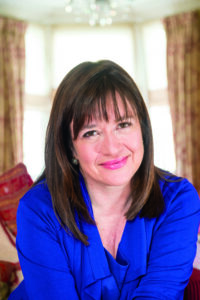
Q & A: Daisy Goodwin on How Maria Callas Inspired Her New Book ‘Diva’
By Francisco Salazar(Credit: Francesco Guidicini)
Maria Callas left an indelible mark on the opera world and continues to inspire artists around the world. Last year the opera world honored “La Divina’s‘ centennial with numerous celebrations, concerts, books, and documentaries, among many other events.
Among those celebrations was award-winning author Daisy Goodwin’s “Diva,” which explores the intimate story of Callas through the heartbreak of losing the man she loved and how she found her true voice. The novel explores Callas’ social life and her relationship with Aristotle Onassis, as well as her work as an artist and what she went through as she performed.
OperaWire spoke to Goodwin about her new novel and her discovery of Maria Callas.
OperaWire: What inspired you to write this book?
OW: There are so many intricate details in this novel that get us into the life of Maria Callas. What kind of research did you do to get these details?
DG: I am a historian by training so the research is the bit I love. I read, watched, and listened to everything I could lay my hands on. I went to La Scala and to Covent Garden to look at their collection of the costumes she wore. I peered into dressing rooms, stood briefly on the stage of the ROH, and looked out into the auditorium. It was quite a moment. I wanted the facts, but I also wanted the feel of her life. My only regret was not getting to see the interior of the Christina, but I did manage to have a look at Skorpios, the island that Onassis bought.
OW: How did you find Maria’s voice?
DG: It took me a while, but when I realized that the real motor in her life was her singing voice, I began to imagine what it was like to be given this almost supernatural gift that could disappear at any point. The thought of standing on stage and reaching for a note and not finding it was terrifying. She was so confident of her ability, yet she lived with this constant dread. It also helped to imagine her as a Diva – in the sense of being a goddess, rather than as a capricious star.
OW: What were the biggest challenges of writing “Diva” and, given it is a fictional retelling, was there a lot of pressure to make sure you got it right?
DG: I decided to write a novel because I wanted to write Maria from the inside looking out. I felt that all the biographies I had never gave you the sense of what it was like to be a performer at that level, or of her innate genius. Above all, I wanted to emphasize Maria’s enormous strength as a person. I see her as a heroine, but not a tragic one. Above all I wanted to be true in the book to Maria, which I have been listening to all my life. I even took singing lessons so that I could better imagine what it was like to be inhabited by a voice of that caliber.
OW: I found this book refreshing and different in the way it tells Maria’s story. Why did you find the need to tell this story right now?
DG: I feel that Maria is in many ways a heroine for today. She demanded and got equal pay to the tenors and even to [Herbert] von Karajan. She didn’t put up with any groping or harassment. She knew her value and insisted upon it. And when Onassis married Jackie Kennedy, she behaved with dignity and restraint. I feel that the real sadness in her life was not losing Onassis, but the premature loss of her voice.
OW: Did you talk to anyone who knew Callas on an intimate level?
DG: My father worked with Zefirelli on a couple of films, so I grew up listening to his stories about La Callas. I wish I had taken copious notes, but luckily I have a very good memory.
OW: Which Maria Callas recording is your favorite?
DG: I love the recording she did of “Divinites du Styx” from “Alceste.” It showcases all the drama and darkness of her voice. I have even tried to sing it myself.
OW: There is a movie coming out about Callas. What are you looking forward to seeing in that film?
DG: I hope that it will show that Maria’s real love was not Onassis but music.
OW: What do you hope people take away from this novel?
DG: I am always delighted when people who have read the book tell me that they have done a deep dive googling everything Maria. If the book brings Maria Callas to a new audience then my work is done.


